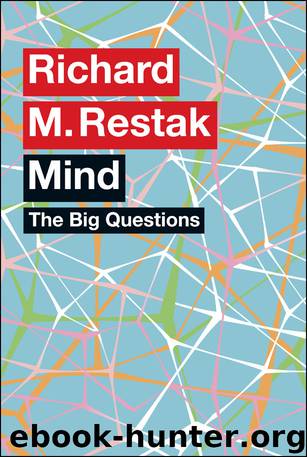The Big Questions by Richard M. Restak

Author:Richard M. Restak [Restak, Richard M.]
Language: eng
Format: epub
Publisher: Quercus
Published: 2014-06-30T16:00:00+00:00
WHAT DOES A BRAIN DO WHEN IT IS DOING NOTHING?
The pleasures and perils of mind wandering
Actively doing something is linked to our sense of purpose. If we feel that we’re doing nothing it’s only too easy to assume that our brain is inactive as well. But our brain is always doing something even though we may sometimes feel that it’s not.
During our waking hours our mind takes the form of a stream of consciousness. When we’re asleep it’s only too easy to assume that our brain is inactive since we’re not conscious of events happening around us. But dreams have always cast doubt on this conclusion. It seems reasonable to assume that whenever one experiences a dream the brain must somehow be formulating that dream. But until the mid-20th century there was no way of proving this. What was needed was some way of explaining how the brain could be active during sleep since nothing is experienced – except in dreams – and nothing can be observed.
With the invention of the electroencephalogram (EEG) by Hans Berger in the 1920s, neuroscientists discovered that the brain is never quiescent and its rhythmic waves never cease. Even when a person is in deep sleep their EEG continues to show electrical activity, albeit a different kind of activity from wakefulness. Only at death do the brain’s oscillations completely disappear.
In the 1950s Nathaniel Kleitman, Eugene Aserinsky and William Dement provided a new vista on the study of dreams when they opened a laboratory in Chicago dedicated to dream research. They discovered that the waking and the dreaming brain possess their own distinctive EEG signatures. Thus the brain isn’t ‘doing nothing’ during sleep but, as these early sleep scientists showed, a lot of functional activity is going on within the brain of the sleeper. And this activity occurs even though – except during dreams – nothing is being experienced subjectively. Among other activities occurring during sleep, new memories are stabilized, long-term memories are consolidated and synapses are created and woven into circuits. (See Do Dreams Have Meaning?)
An important principle emerged from the research by Berger and by the Chicago group: we can’t rely on subjective experience as a determiner of whether the brain is doing anything at any given moment. To rely entirely on subjective experience for proof that the brain is doing something rather than nothing risks an inverse variant of the refrigerator light problem: a young child concludes that the refrigerator light must always remain on because he always finds it on whenever he opens the refrigerator door to check. By definition, whenever we wonder where our minds might go when they aren’t active we can be certain that our minds are active at that particular moment.
Download
This site does not store any files on its server. We only index and link to content provided by other sites. Please contact the content providers to delete copyright contents if any and email us, we'll remove relevant links or contents immediately.
| Administration & Medicine Economics | Allied Health Professions |
| Basic Sciences | Dentistry |
| History | Medical Informatics |
| Medicine | Nursing |
| Pharmacology | Psychology |
| Research | Veterinary Medicine |
The Art of Thinking Clearly by Rolf Dobelli(10408)
The 5 Love Languages: The Secret to Love That Lasts by Gary Chapman(9773)
Mindhunter: Inside the FBI's Elite Serial Crime Unit by John E. Douglas & Mark Olshaker(9312)
Becoming Supernatural by Dr. Joe Dispenza(8194)
Nudge - Improving Decisions about Health, Wealth, and Happiness by Thaler Sunstein(7689)
The Road Less Traveled by M. Scott Peck(7588)
Mastermind: How to Think Like Sherlock Holmes by Maria Konnikova(7313)
Enlightenment Now: The Case for Reason, Science, Humanism, and Progress by Steven Pinker(7303)
Win Bigly by Scott Adams(7181)
The Way of Zen by Alan W. Watts(6590)
Factfulness: Ten Reasons We're Wrong About the World – and Why Things Are Better Than You Think by Hans Rosling(4729)
The State of Affairs by Esther Perel(4709)
Gerald's Game by Stephen King(4636)
Man's Search for Meaning by Viktor Frankl(4567)
The Confidence Code by Katty Kay(4244)
Thinking in Bets by Annie Duke(4213)
The Healing Self by Deepak Chopra(3567)
Hidden Persuasion: 33 psychological influence techniques in advertising by Marc Andrews & Matthijs van Leeuwen & Rick van Baaren(3548)
The Worm at the Core by Sheldon Solomon(3483)
